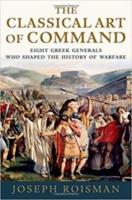
OUP (2017) h/b 416pp £22.99 (ISBN 9780199985821)
Warfare was a constant factor in the life of the ancient Greek city state. Political leaders, whether Athenian democrats, Spartan kings, or Syracusan tyrants, frequently served as military leaders, too, adapting those skills, with which they dominated public affairs, to the strategic requirements of campaigns and the tactical demands of the battlefield. These saw them fighting by land or sea, in massive set-piece engagements involving hoplites, light infantry and cavalry, in ambushes, in lengthy sieges, or in sudden ‘commando’ raids with an elite detachment of hand-picked troops. In this engaging, well-argued and thought-provoking study, R. explores the careers of eight commanders—Leonidas, Themistocles, Pericles, Demosthenes (son of Alcisthenes, not the 4th C orator), Lysander, Dionysius I, Epaminondas and Pelopidas—setting their lives in historical context, considering the challenges they faced, assessing the resources which they and their enemies possessed, and examining their most significant battles, before evaluating their individual strengths and weaknesses.
Although by the early 4th C practitioners such as Xenophon were writing handbooks for the officer class, there was little formal training in military command, and it was ‘rare for a Greek general to research battles fought before his times’. Rather, leaders learned from their own experience, and personality played as important a part in their success or failure as skill in disposing forces, utilizing topography, or acquiring accurate intelligence. Equally, despite the most meticulous preparation, communication in battle could be difficult, and, with commanders invariably fighting in the front ranks, all too often a general’s death could signal defeat for his army.
Addressing both a scholarly and a general readership, R. has chosen his subjects with great skill. They provide ample scope for appraising a wide range of encounters, from Sparta and her allies facing Persia’s might at Thermopylae to the conflict with the Carthaginians at Motya and Thebes’ victory at Leuctra, by way of Salamis, Pylos and Aegospotami to name but a very few. At the same time they allow R. to present a potted history of fifth- and fourth-century Greece, albeit focussing on episodes which demonstrate the art of command.
He is to be especially commended for the clarity, with which he traces the often complex shifts in alliances, particularly in the period after the Peloponnesian War—a not insignificant detail, since the ability to cement or undermine these alliances was an important weapon in the commander’s arsenal. With 38 illustrations and 38 maps, an extensive bibliography and a useful survey of primary sources, this is a welcome addition to the library of anyone interested in the ancient Greek world. Its only flaw (yet one that is sadly irritating) is the sloppy copy editing, blighting several of the maps.
David Stuttard
